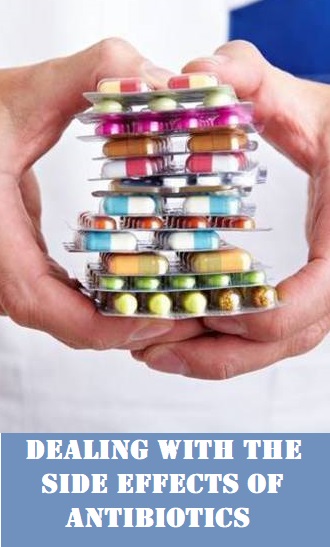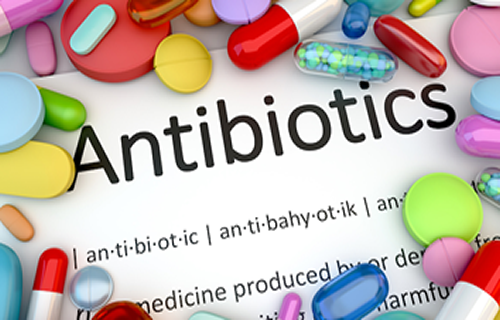How to Deal with Antibiotic Side Effects?: When you suffer from a urinary tract infection, an ear infection, strep throat or any other bacterial infection, doctors usually prescribe antibiotics. These medicines treat bacterial infections- different types of antibiotics work in fighting different strains of bacteria and certain types of parasites. The problem is that these medicines often have a list of side effects, including nausea, vomiting, diarrhea, allergic reactions, vaginal yeast infections and inner ear problems. Fortunately, you can deal with antibiotic side effects with the help of some home remedies.

How to Deal with Antibiotic Side Effects Naturally? 10 Home Remedies
Here is a look at natural ways to deal with the side effects of antibiotics:
1. Garlic
Allicin, a sulfur compound found in garlic, is found to act as a natural antibiotic. It is effective to reduce and treat the side effects of antibiotics prescribed by doctors. If you suffer from any of the side effects of these medicines, increase your intake of garlic.
- Add garlic to your daily diet.
- You can also take 500mg garlic supplements daily to detox your body from the harmful substances left in your system by antibiotics. However, you should consult your doctor before you take any supplements.
Related: Steroids Side Effects – The Dangers Of Steroids
2. Probiotic Yogurt
Studies have found that probiotics can help in preventing diarrhea caused by antibiotics. Probiotic yogurt has also been found to reduce gastrointestinal disturbance associated with antibiotics in children.
- Eat probiotic yogurt as it is when you are taking antibiotics. You can also make a smoothie with it.
- Do this several times a day to deal with antibiotic side effects.
Related: 7 Serious Sleep Deprivation Effects & Tips To Sleep Better [Infographic]
3. Probiotic Supplements
What if you are allergic to dairy products? Fret not, you can get the probiotics you need by taking supplements. This can help prevent gastrointestinal issues that are caused by the use of antibiotics. Take note that you will need to continue taking these supplements, long after you have completed your course of antibiotics.
- Take probiotic supplements daily to fight the side effects of antibiotics. However, make sure that you consult your doctor before doing so.
Related: 6 Home Remedies to Get Rid of Mold Allergies & Prevent Its Recurrence
4. Milk Thistle Supplements
Your liver can suffer a lot when you take traditional antibiotics – as it is the organ that breaks down benefitsingested medications. Milk thistle happens to be rich in antioxidants, just what you need to protect the liver and help you deal with antibiotic side effects. Silibinin, its active ingredient, also has hepatoprotective and detoxifying effects. This makes milk thistle an even more excellent natural remedy for protecting the liver from the effects of antibiotics.
- Take milk thistle supplement, which is available in the form of capsules, liquid extract and tincture. Consult your doctor to determine its suitability for your condition and the proper dosage.
Related: Try These Top 6 Home Remedies for Gastritis for Instant Relief
5. Apple Cider Vinegar
Thanks to its antibacterial properties, apple cider vinegar is effective in fighting harmful bacteria in your body. It also helps in controlling diarrhea, which is one of the most common side effects of antibiotics. It is rich in nutrients that boost immunity.
- Take 1 glass of water and add 1 to 2 tablespoons of raw, unfiltered apple cider vinegar to it and mix well.
- Drink this solution 2 times daily until your condition improves.
Related: 100% Safe and Natural Home Remedies for Vomiting
6. Ginger Tea
Whether you suffer from nausea, vomiting or diarrhea upon the consumption of antibiotics, coping with it is made easier with the help of ginger tea. Ginger is effective in alleviating gastrointestinal and stomach discomforts. It has natural antibiotic properties that can help prevent and treat health issues directly caused by bacteria. Additionally, this powerful herb in its fresh form has an antibiotic effect that fights respiratory and periodontal infections and food-borne pathogens.
- Grate 1 inch of fresh ginger.
- Boil it in 1 ½ cups of water for 10 minutes and then strain.
- Add lemon juice and honey to taste and sip the tea slowly.
- Do this 3 times a day until your condition improves.
- You can also take ginger supplements to help yourself deal with antibiotic side effects, but consult your doctor before doing so.
Related: How to Get Rid of Nausea? – Top 20 Natural Home Remedies For Nausea
7. Fermented Foods
Like yogurt, fermented foods contain a high amount of probiotics. Hence, they can help in preventing gastrointestinal issues that are caused by the use of antibiotics. You need to take in fermented foods long after completing your course of these medicines. Simply include fermented foods in your regular diet.
- Include fermented foods like kimchi, pickled carrots, turnips and beets, pickles, sauerkraut, kefir, and Kombucha in your diet.
- Consult your doctor and ask if you can take probiotic supplements.
Related: How to Get Rid Of A Fever? 6 Best Home Remedies For Fever
8. Bland Foods
If you want to counter issues like nausea, vomiting and diarrhea caused by antibiotic use, you should eat only bland foods during and after your course. Such foods are easy to digest and give your gastrointestinal tract a rest, allowing your body to recover from the strong effects of these medicines. This is extremely important as antibiotics do not only kill bad bacteria, but good bacteria as well. Avoid spicy and sugary as well as carbohydrate-rich foods or you will suffer from more nausea, vomiting and diarrhea as your GI tract will lose its ability to keep up with demands.
- Eat plenty of dry crackers, white rice, plain bread, etc. during and after your course of antibiotics. You should also eat raw or steamed vegetables during this time.
Related: How to Make Yourself Throw Up with Home Remedies?; Tips & Remedies
9. Fluids
Your body loses fluids when you suffer from vomiting or diarrhea. Let’s not forget that medicines can also cause dry mouth. You can counter this by drinking more water. Avoid beverages that contain caffeine or alcohol or have high sugar content, like colas, coffee and tea, as they can make your symptoms worse.
- You can make sure to keep your body well hydrated by drinking plenty of water throughout the day.
- For severe fluid loss, drink a mixture of water, salt and sugar to help in replacing electrolytes that your body needs.
- Additionally, drink the juice of fruits and vegetables that have high water content as well as broth. This will not only keep you hydrated, but also provide nutrients to nourish your body and prevent it from becoming weak, helping you deal with antibiotic side effects better.
Related: How To Get Rid of Diarrhea? 12 Natural Home Remedies for Diarrhea
10. Keep Yourself Healthy
One of the best ways to deal with the side effects of antibiotics is to make sure that you are in the best of health so that you do not have to take these medicines for long. You can support your health in a number of ways and avoid or minimize the need to take antibiotics.
- Follow a diet that is rich in fiber, antioxidants and other essential nutrients required to stay healthy.
- Exercise regularly. You do not have to do vigorous exercises. Light to moderate exercise like regular walks, swimming, etc. are enough to keep you healthy. The idea is to stay physically active.
- Make sure that you get enough rest and sleep. Additionally, practice relaxation techniques to manage your stress levels.
- Last but not least, reduce your alcohol intake and quit excessive smoking. Both of these can have an adverse effect on your immunity.
Related: 10 Natural Antibiotics From Your Kitchen You Should Know
There are times when you have no choice but to take antibiotics. The important thing is to make sure that you take the medicine strictly as directed by your doctor. You should also start preparing to deal with antibiotic side effects as soon as you start your course. This is the best way to prevent the side effects and make sure that they do not hit you too hard if you do experience them.
